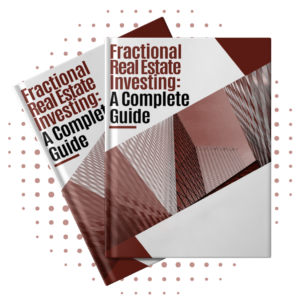
Do savvy real estate investors ever invest in real estate without buying local, residential, or commercial properties?
They absolutely do. Indirect property investing, where investors use funds or other instruments to invest in real estate, is growing.
Commercial real estate investors believe that this trend has staying power. So how does this work? Here are some of the most popular types of indirect real estate investment plays when you’re trying to figure out how to invest in real estate without buying and managing property.
Jump to a Section:
Invest in a REIT
Real Estate Investment Trusts (REITs) are companies that handle all property purchases, as well as property management and sale. They are similar to mutual funds.
REITs pool the capital of many investors who can profit from the revenue generated. REITs can own a variety of properties, including multifamily housing, industrial properties, and retail and office buildings. Let’s take a look at each of these as well as some of the pros and cons of this particular approach.
There are four major classes of commercial real estate that you can invest in through REITs.
Four Types of Property
Real Estate Investment Trusts or REITs can invest in any or all of four types of real estate property. REITs offer individual investors the opportunity to invest in real estate without buying individual properties.
Multifamily housing
The most common example of this type of property is a rental property such as large apartment buildings. Real estate developers plan these buildings with an eye toward community development and profit from individual renters.
Industrial
Industrial real estate is also a growing sector of commercial real estate nationwide.
Industrial real estate provides physical locations for manufacturing and industrial processes that power local and state economies.
With many of these properties, it’s important to be located near major transportation access, such as freeways, airports and railroad lines.
Retail
Malls are often what most people think of when they think about commercial real estate. Retail buildings are still very much in demand in many communities.
Office Buildings
In addition to retail, there is a whole range of commercial uses that have to do with the administration of business and not consumer retail. Healthcare is part of this, but so is professional office space, which comprises a significant portion of commercial real estate.
Consider Real Estate ETFs
Investors also have the option of buying into Real Estate Exchange-Traded Funds (ETFs), which are securities-based funds. These securities are real estate-related, most commonly REITs, and are tracked because they can be purchased on the stock exchange. Dividend distributions are received after investing. These investments are less risky, but they also have a lower potential income. A real estate ETF allows you to own a portion of a building, such as a condo or an apartment, rather than the entire structure.
Real Estate ETFs were created as an alternative that’s easy to buy and sell during a given market day and are approved by agencies like the U.S. Securities and Exchange Commission.
Individual real estate property, by contrast, is difficult to buy and sell to invest in real estate, not just during a given market day but even over a series of months on the market.
Invest in Home Construction Business
Another way to invest in real estate without investing in an individual property is by investing in a private home construction business.
Investors with cash flow can buy into a company that has its hand in new real estate construction. Builders are active all over the country, and many of them allow for private investment. You’ll get a direct investment in whatever that company is building at the time.
Real Estate Mutual Funds
There are also a variety of mutual funds available to investors that have underlying real estate holdings.
What’s the difference between a real estate mutual fund and a Real Estate ETF?
Much of the difference relates to how the funds are managed and presented to investors through a brokerage platform.
Real estate mutual fund choices are the traditional type of fund. They trade on a basket of equities, but often have significant minimum contributions. Investors don’t have an easy time buying into and selling out of them on a quick turnaround.
ETFs, as mentioned above, are the opposite — they tend to require smaller investment amounts, they’re easy to buy and sell, and the cost basis is easy to calculate.
Invest in a Real Estate Focused Company
In addition to builders, investors can invest in a company with some secondary real estate investments.
One example is the real estate investor-focused companies offering new apps, platforms, and digital or electronic services for real estate sales.
Some of these companies have developed real estate investing software to make neighborhood research easier and more accessible for investors or help investors build their strategies in other ways.
Other companies work with loan origination and help people purchase or refinance or invest in real estate more efficiently and straightforwardly.
All of these can be additional on-ramps for real estate investors with cash flow to start making plays on the broader market with other real estate investments.
Tokenized Real Estate
Tokenization of real estate is one of the fancier new-tech and next-generation types of investments in real estate with real estate companies.
Tokenized real estate investing relies on decentralized finance assets which use cryptocurrencies to buy into particular real estate properties or funds.
Instead of purchasing a property or partial ownership of a property in the traditional way, increasingly real estate owners will tokenize the value of their real estate assets - which will be tied to the underlying value of a property.
In the age of NFTs, Stablecoins, and utility tokens, this type of strategy may appeal to tech-minded investors, but it comes with its own slate of benefits and drawbacks.
Conclusion
There are a growing number of real estate-related investment options that do not require you to purchase individual real estate properties to invest in real estate. Many of these options enable you to buy into real estate without having to invest enormous amounts of money.
In the end, your real estate strategy should be directed by what makes the most sense for your wallet and your specific financial situation.
EquityBrix can help you grow your wealth through our fractional real estate investment platform. Our team marries the needs of investors and real estate developers by providing opportunities for above-market returns to investors. EquityBrix is committed to creating high-yield investment offerings, and we can help guide you through the new era of real estate investing.
If you want more information about tokenized real estate investing go to EquityBrix or EquityBrix.com/Learn.
If you are looking to grow your wealth and diversify your investment portfolio by learning about innovative ways of investing in real estate go to EquityBrix, or contact us for more information, or sign-up for the EquityBrix Newsletter.
EquityBrix is not an investment adviser. This information is for educational purposes only and does not constitute investment or tax advice. It’s important to be informed and to make your own investment decisions or do so in consultation with a professional financial advisor. Under no circumstances should this material be used or considered as an offer to sell or a solicitation of any offer to buy an interest in any investment. Any such offer or solicitation will be made only by means of a written online prospectus relating to the particular investment.
FAQs
Can you invest in property without buying?
You can absolutely invest in real estate without purchasing a single property. We’ve outlined several ways this works above, and these options are readily available to investors.
What is the minimum amount to invest in real estate investing?
Each fund has its minimum contribution, but these requirements are much lower as a rule than the down payment needed to purchase an entire property.
What are three ways in which you can invest in real estate?
First, you can buy an individual property the traditional way, through an agent.
Second, you can use an instrument like a REIT to make a sophisticated investment play.
Third, you can get involved in managed funds easily and quickly and make significant stable gains that way.

